Housetrained dog marking? how to stop it!
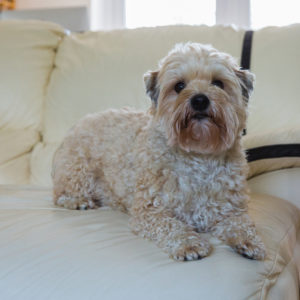
Is your housetrained dog marking? My daughter and her husband bought a new home a few years back. As it happens, it was an old veterinary practice. When we went to visit for the first time, I knew we would have a problem with one of our dogs. He was in the habit of weeing in places he had not been to before. I knew with the home being an ex vets, my dog Jazz would quickly find a niffy spot to cover. He was too young to be castrated, so we had to be diligent when visiting other households.
I was ready and waiting!
As it happens, I was waiting for him to do the deed and chastised him with a sharp “NO” as soon as he started to lift his leg. Although this stopped him for the moment, I knew it would just be a matter of time before he tried to do it again. This property was obviously covered in smells from past animal visitors. It wasn’t long before he found a new place to wee. I apologised profusely to my daughter and at the same time explained what was happening.
Plenty of smells in the old veterinary practice
The old vet practice had been empty for a couple of months, even so, there were still plenty of old smells which Jazz was picking up on. We all know their sense of smell is their primary sense. His job, in his mind, was to counter those smells with his own. This would make the property more comfortable for him, rather than having the smell of other dogs and animals around.
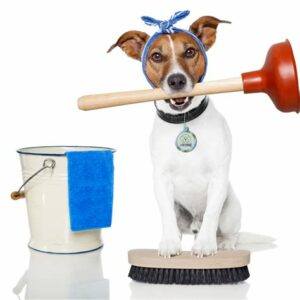 What would you do?
What would you do?
If you moved into a new house and could still smell odours from the previous occupant, you would probably get the household cleaners out smartish and try to eliminate the smell. As a dog hasn’t got the wherewithall to clean up, his option is to replace the odour with his own smell instead, obvious to a dog!
Strange places can be stressful
Dogs will often urinate in new surroundings, such as a new home. This can be quite irksome for the owner, especially if he mistakes this behaviour to be a new housetraining problem. A strange house can be stressful for a dog and they often scent mark their new area to help them with their anxiety. Their own smell calms them and marks out their new home. It is often short lived and the urinating will settle down once the dog accepts his new place of residence!
New home tips
Housetrained dog marking is a common problem so when you move to a new home you could try these tips. It is a good idea to put your smell in your new home first. After you’ve been around the whole of the house, introduce your dog to his new home. Firstly though, remember to go through all doors before your dog. Don’t let him go charging around the house as though he owns the place. If you go in first, this signifies to him that you, the family leader/s own the space and he is being invited in. Also, introduce your dog to just one or two rooms at first, shut the doors of the other rooms. This will alleviate some of the anxiety he may suffer. Introduce him to the rest of the house slowly, entering each room before him.
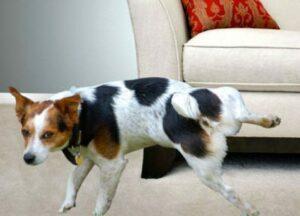 Strange environments can incite marking
Strange environments can incite marking
If a dog visits another dwelling he’s not been in before and especially if that home has or has had, another dog living there, he could urinate to put his own smell in the strange environment. This often happens with entire dogs and it was the reason we had both our dogs castrated. It is most embarrassing when your ‘housetrained’ dog does a wee up the chair leg where your host is sitting! For us, castration stopped the behaviour immediately.
Benefits of neutering
There are other benefits of neutering. Males are less likely to hump and of course cannot get testicular cancer and females are less likely to get mammary gland tumours. But cancer in dogs is another post which I will cover at a later date.
 Check with the vet if not sure
Check with the vet if not sure
But, before we go any further, if your dog is displaying unusual behaviour and you’re not quite sure as to why he may be peeing in the house, best to check with your veterinary first to make sure there are no health issues such as urinary tract infection.
Castration does not always solve marking
Although entire male dogs are more likely to exhibit covering behaviour, castration does not always solve the problem. But, as a rule of thumb, most dogs neutered or spayed at an early age, (around 6 months my vet advised), do not scent mark in the home. Dominant bitches sometimes do mark, often to broadcast their coming into season or being in season. Best to keep an eye on your best carpet or persian rug! It’s interesting to note that marking in the house seems to be a trait of small dogs rather than larger.
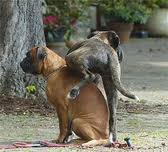 More than one dog in the home?
More than one dog in the home?
Two or more dogs in the home can cause a problem with scent marking. If the dogs are similarly dominant, they may scent mark because of the competition to be top dog. Also, if another dog is brought into the household, it could start marking problems.
Visiting friends and family
If you’re visiting friends and family and you think your dog is likely to scent mark in the house, the only thing you can do until you find a solution, is to keep your dog under your control. Leave his lead on and keep an eye on him. If he shows signs of marking ie. sniffing, circling, give him a gentle tug and say “NO” firmly. Do not hit him, that will be counterproductive and just make matters worse. Make sure he has had a good walk before your visit so his bladder is empty. If there are no other pets in the house, then your dog may not mark at all.
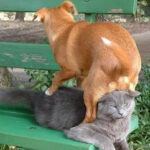 Catch him in the act!
Catch him in the act!
Do try to catch him in the act, otherwise he won’t know that his behaviour is unwanted. Remember, he’s not doing it to upset you. Many owners have this idea that a dog does ‘naughty’ things to ‘spite’ the owner or ‘get their own back’. Dogs do not think this way, unfortunately we humans do! Dogs live in the moment and their behaviour is instinctual. Humans live in the past, the future as well as the present. Humans take umbridge, take offence, get annoyed, get indignant and lose their temper. Quite a handicap really! Dogs do none of these behaviours and in that respect are superior to us with their emotions.
 It’s difficult for him too!
It’s difficult for him too!
If you want to stop this unwanted behaviour you need to catch him as he’s about to pee. This is the quickest way of teaching him that the behaviour is not tolerated by you. It is a difficult task for a dog to stop doing something instinctual to him. Remember this when you are trying to eliminate his marking, his barking, his humping and all the other instinctual behaviours he exhibits. You must be calm but assertive when training him. Never lose your temper or get frustrated and speak calmly. Easier said than done I know! You need to be his leader, the one he trusts and wants to follow and please.
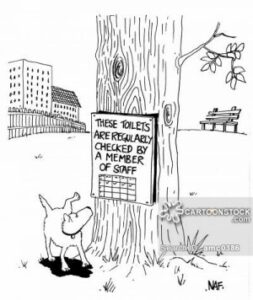 Cleaning up!
Cleaning up!
By the way, cleaning up the area that has been urinated on with bleach or disinfectant will not do the job. Use a product with a stain and odour remover. These contain pro-bacteria producing enzymes to eliminate pet stains and odours. Most pet shops and vets will sell them. 50% vinegar 50% water is supposed to be a cheaper alternative. I haven’t tried it myself.
Be thorough!
Be thorough; your dog will tell you where old marks are, or an odour he wants to cover. Just watch him. If he stops and sniffs an area, give it a squirt with the enzyme spray, just to be sure. If he has urinated on any soft surfaces, be extra diligent and clean thoroughly. It may be you will have to discard some soft furnishings and renew.
Be prepared when visiting!
If you’re visiting, take your spray with you, just in case. If you’re diligent, you will stop the behaviour but you must catch him just before or during the act. Know the signs and be ready! Once he knows what you want, he will do his best to oblige, dogs are like that!

It is amazing how far dogs go to define their territories. I used to think that dogs pissed for the same reasons as humans, but you have made it clear that it is for dog marking.
Had a neighbor who castrated her dog to prevent him from weeping all over the place. Guess what? It didn’t stop the dog from this practice. I’ll have her read your post to learn a thing or two on how to prevent dog barking.
It’s great to know that dogs do not harbor grudges like humans. They live in the present while humans live in the past, present, and future.
Yes Israel, it is quite amazing how much information a dog gains from sniffing his ‘pee mail’. He knows immediately if the dog that has left the ‘message’ is known to him. Have you ever seen a dog wag their tail in recognition when sniffing a tree or pole? He will also know if the dog is a bitch or a dog and if a bitch, whether she is in season or not. As for your friend, it could be his dog had an infection which caused incontinence problems, or he may have been nervous or fearful which often induces leaking.
OK, I admit, I was a bit put off to think that a dog trainer could teach my dog to be a better pet. I always thought trainers actually taught owners more as well. But when I read that you are a Behaviourist for dogs? That seemed silly, at least until I read about your approach to helping dogs and owners. Actually we are usually having trouble with behaviour. With an unwanted reaction to a request, we think we are making. I never considered that the dog might not be feeling well or wasn’t completely healthy. So you have convinced me with all the supporting information you have presented that helping owners with their dogs’ behaviour is really the help we need. This puts the whole business of having a pet we can enjoy in the house with us in perspective for me. I appreciate your view of problems and solves, Thanks for the informative article.
Hello Sami, we have spoken before I remember and thank you for your valuable comments and input. Yes, there is a distinct difference between a dog trainer and a dog behaviourist, as you have already concluded. Learning how your dog ticks solves many problems. An understanding and the consequential patience the owner gains when he knows why a dog does what he does, helps owner and dog bond. Then the joy of owning a dog begins.
Hello there, thank you this very detailed and informative post, I must say this is really a post In due season for me as this is exactly what I am looking for, I just moved into a new apartment with my dog and really I have been very disturbed about my dog’s marking and I have been looking for how to stop him but this post right here has just made it easy for me I will put these tips to practice on my dog and I hope it works.
I’m so pleased Jomata you have found value in this post. If you are diligent and persistent and at the same time calm and assertive, you will soon get to grips with your dog’s marking. Understanding the nature of the dog goes half way to finding and exercising the solution. Work at making your dog realize you are in charge, that will also help with many problems, not just marking. Good luck to you and your faithful friend!